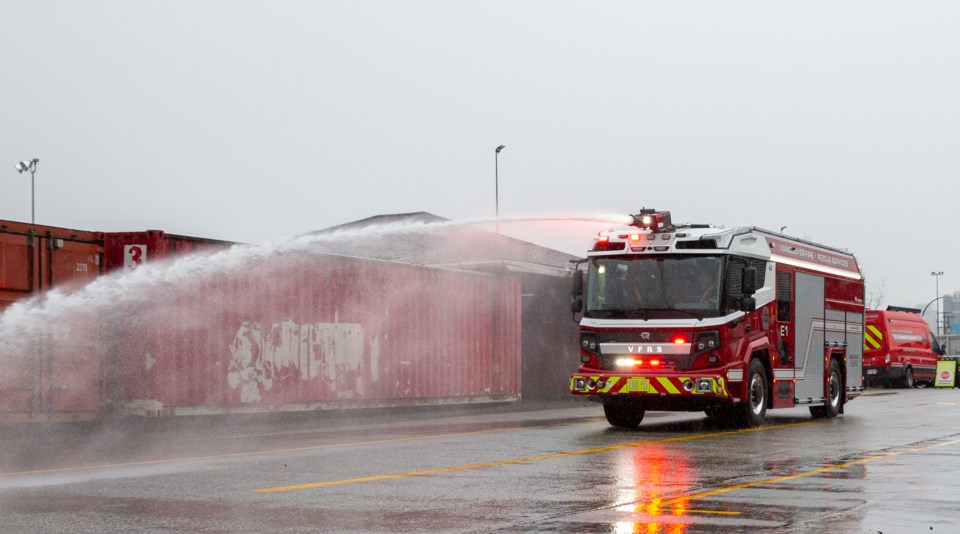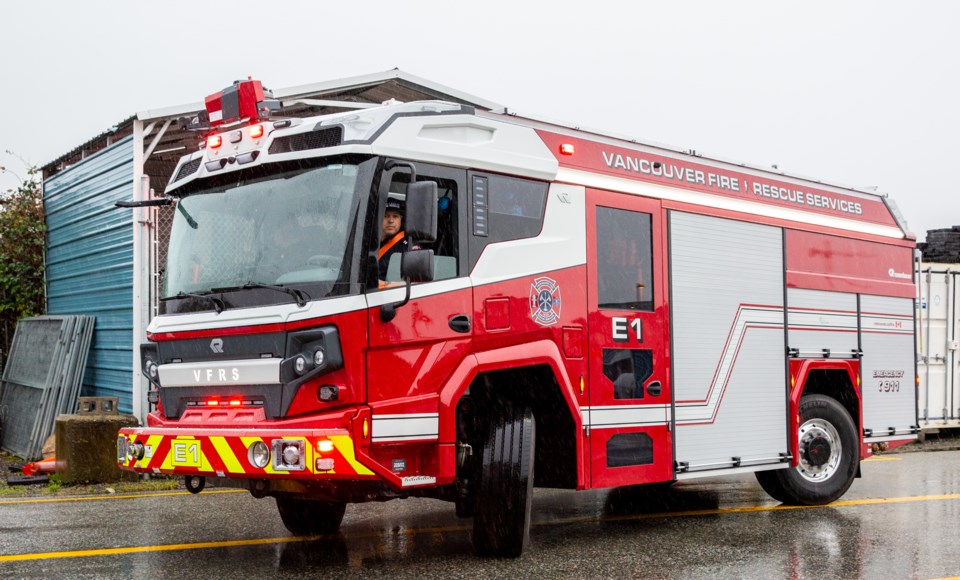It is Canada’s first-ever electric fire truck.
In fact, it’s only the second one operating in North America — Los Angeles was the first in May 2022 — and it now has a home at the Vancouver Fire Rescue Services' main hall in Strathcona.
Chief Karen Fry and Mayor Ken Sim unveiled the $1.8-million Rosenbauer RTX pumper truck Monday at the department’s training facility on Chess Street, where firefighters, new recruits and media all got a look at the Austrian-built vehicle.
“We've been out training on it all week, and we're really looking forward to the positive impact that this will have for our city,” Fry said. “And honestly, once we get this in place, I can't wait to see more of these engines come into service in Vancouver.”
The key feature of the truck is the two large Volvo-Penta batteries, with one directly behind the cab and the other between the front and rear axles of the vehicle.
The batteries have a 100-kilometre range.
If the department were to exceed that range — which the experience in Los Angeles suggests it will not be a major concern — a 300-horsepower diesel motor inside the truck would kick in when the charge drops to 20 per cent to recharge the batteries.
The motor would also power the truck’s pump.

Tight turning radius
The truck doesn’t look much different from a traditional engine, although it is shorter and narrower. At the same time, it is designed to allow up to six firefighters in the cab, where a person over six feet tall can easily stand up without banging their head.
What impressed many at Monday’s news conference was the truck’s tight turning radius, which Capt. Shawn Dighton demonstrated on a road at the training facility; all four of the truck’s wheels can move as if on a swivel, giving the driver the ability to “crab sideways” to get in and out of tight spots.
“The advantages are obviously the size and the manoeuvrability — able to get through traffic, get through those narrow laneways where we've got cars parked on both sides of the street,” Dighton said. “A lot of the department hasn't seen the capabilities of it yet, but I think once they see it, there'll be a lot of buy-in.”
The other advantage Dighton pointed out was how quiet the truck is compared to a traditional diesel-powered fire truck, which can make it difficult to hear in the cab and when at a scene.
“We're standing here talking and the truck is actually running right now,” he said. “In our old trucks, we wear headsets all the time because it's so loud. With this truck, we can be driving down the road, and you can talk back and forth without the headsets.”

Carcinogens, pollutants
In addition, using a truck that doesn’t rely on diesel fuel means firefighters are not exposed to carcinogens and pollutants from exhaust, which can lead to asthma, respiratory illness and cancer — a point Fry made in her remarks.
“At fire scenes, at emergency incidents and at motor vehicle accidents when our trucks are running, they're off-gassing,” the chief said. “So with the electric [truck], we're reducing that impact not only to our firefighters who are working around the engine, but also to the community that we're serving as well.”
No estimate was provided Monday on how much gas will be saved by going electric, but the experience in Los Angeles is that its truck used 22 gallons of diesel fuel over six months in 1,482 calls, according to Todd McBride, sales and marketing manager for RTX.
“So 98 per cent of what this truck does is done by battery power,” said McBride, who attended the news conference.
Reduce injuries
While the electric component of the truck is its main feature, McBride told Glacier Media that ergonomics was also key to the vehicle’s design.
The truck is lower than a traditional engine and can be manually lowered or raised, making it easier for firefighters to climb into the cab or descend from it; many injuries suffered by firefighters are caused by exiting fire trucks, according to an information sheet supplied to media Monday by the department.
“They’ve got all that gear on their back [when exiting a truck],” McBride said. “We often say your body is kind of like a paperclip. You can open and close it, but eventually it's going to break. It's the same thing with a firefighter’s body.”
The $1.8-million price tag was not the full cost paid by the department, with Fry estimating $750,000 was covered in senior government rebates.
“We expect that it's almost doubled in price since then,” she said. “I think it's closer to $3 million now.”
The Vancouver fire department also recorded another first related to reducing greenhouse gas emissions when in April 2022 it opened Canada's first zero-carbon fire hall.



